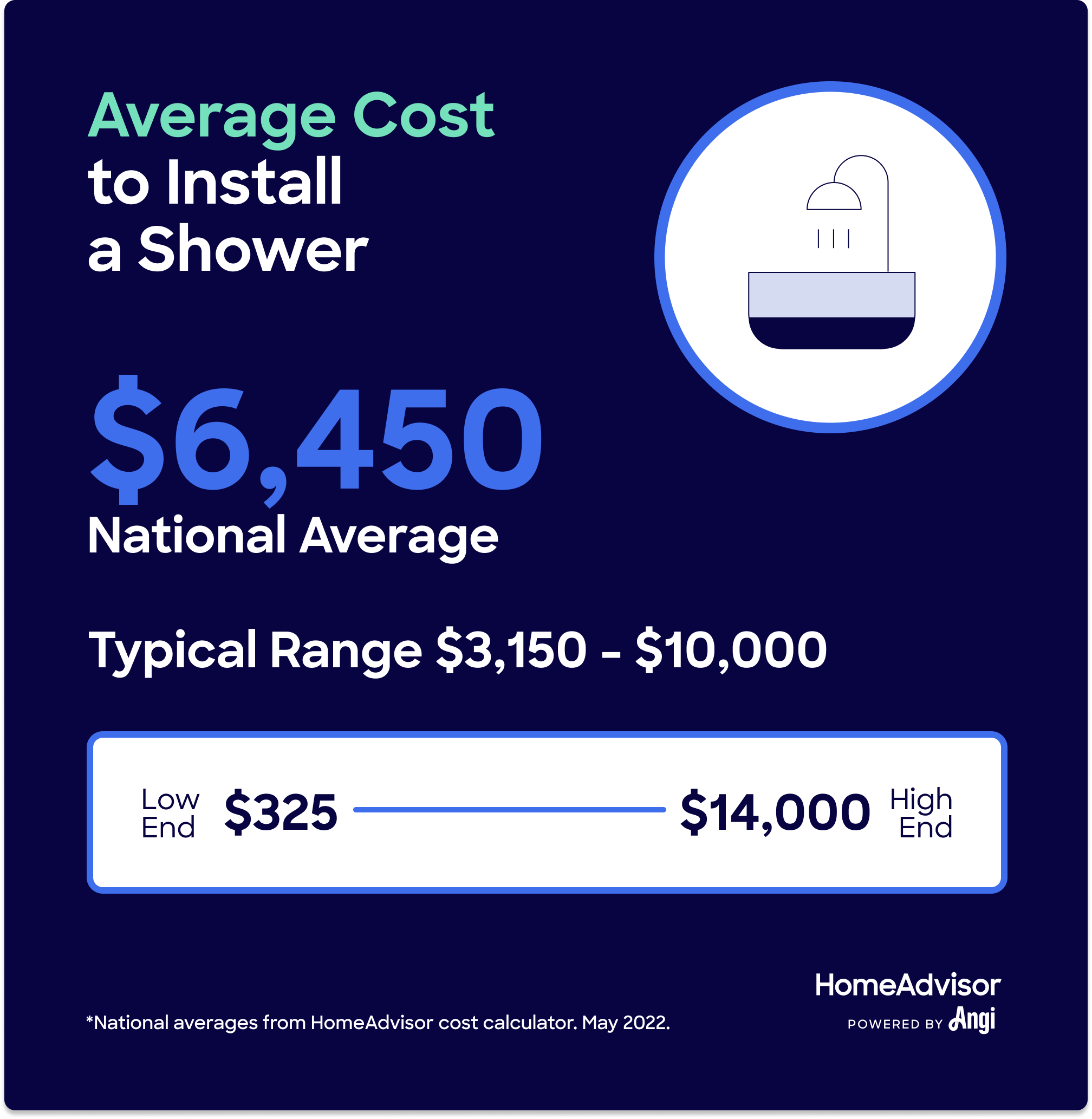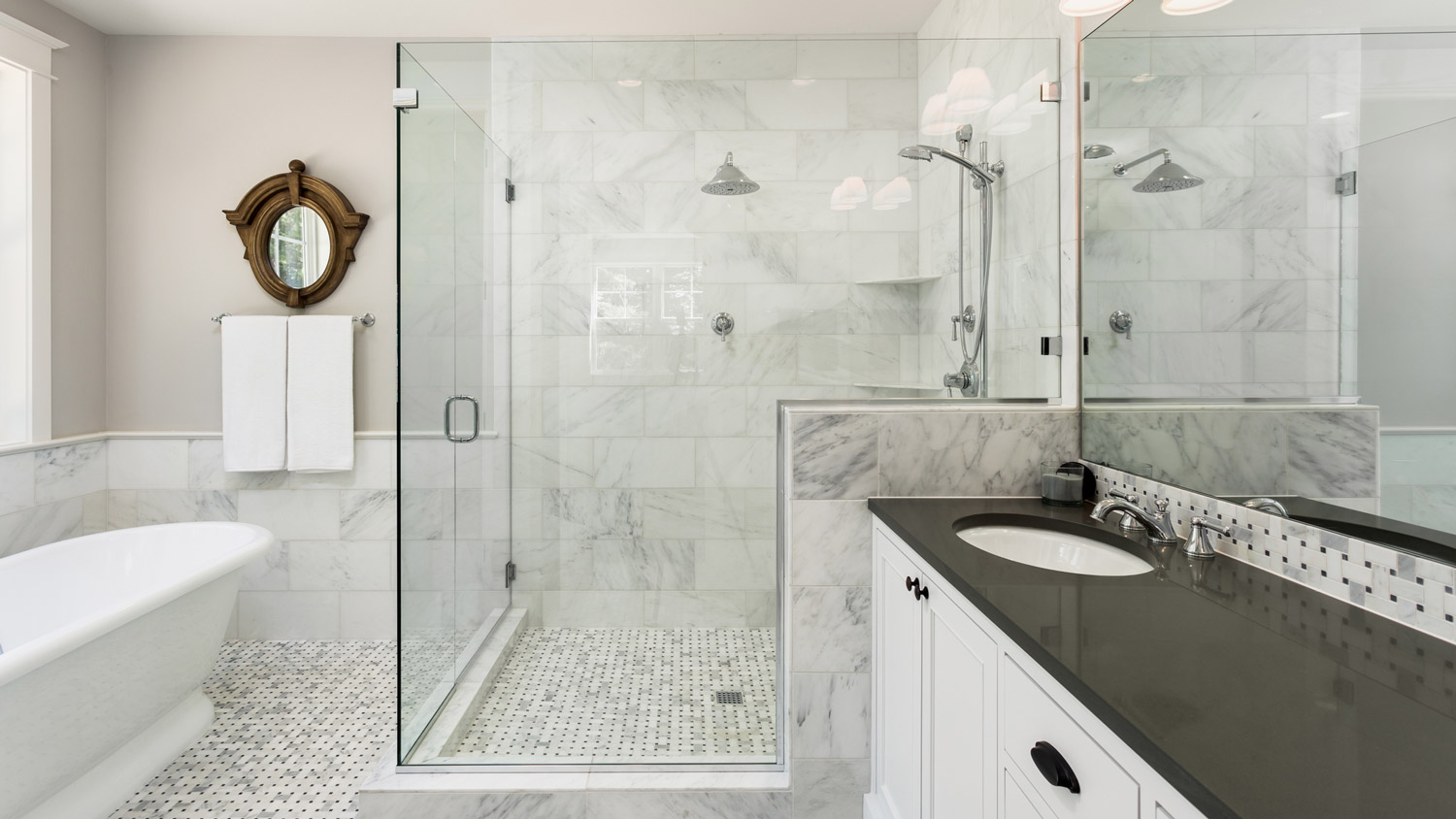How Much Does Shower Installation or Replacement Cost?
Typical Range:
$4,467 - $12,281
Typical Range:
$4,467 - $12,281
Cost data is based on actual project costs as reported by 7,194 HomeAdvisor members. Embed this data
.
.
.
.
.
.
.
.
.
.
.
.
.
.
.
.
.
.
.
.
.
.
.
.
.
.
.
.
.
.
•
•
•
•
Installing a new shower costs $8,134 on average, with a typical range between $4,467 and $12,281. The total depends mostly on the size, style, and material used. For example, a standard shower size is 32-by-32 inches, and may cost $750 to $3,000 just for the product without factoring in installation costs.
Your new shower installation or replacement project could also be influenced by the materials you choose for shower tiles. Ceramic, one of the most common materials, ranges from $0.50 to $15 per square foot, depending on quality. Other materials like engineered marble may cost $8 per square foot, while cultured marble could cost as much as $65 per square foot.
Get all the info you need to budget and get your shower installation or replacement project in motion below.
2022 Notice: Material Prices Are Surging
Demand for siding and other building materials has grown over the past year. And as a result, manufacturers are increasing materials prices. Prices have gone up 5% to 10% this year, and many parts of the country are experiencing long delivery times. If you're planning a building project, we recommend starting as early as possible in the season, preparing for potential price fluctuations, and allowing extra time to order materials.
Let's calculate cost data for you. Where are you located?
Where are you located?
| National Average | $8,134 |
| Typical Range | $4,467 - $12,281 |
| Low End - High End | $375 - $16,310 |
Cost data is based on actual project costs as reported by 7,194 HomeAdvisor members.
Here are some factors to consider that'll impact your budget when calculating shower replacement costs.
A 32-by-32 or 36-by-36 inch shower are the two most common sizes. Expect to pay more for both the product and the cost of shower installation when getting a bigger size.
A standard shower, bathtub and shower combo, corner shower, and custom-design shower are just four of the types of showers you might install. Basic models that can be installed into pre-existing spaces in your home will cost the least amount.
A 32-inch-square acrylic stall runs from about $750 to $3,000. On the other hand, a custom tile shower of the same size ranges from $4,200 to $8,500.
Replacing your shower costs $1,200 to $6,350, including the removal of the old unit. If you need to add new pipes or relocate them, you’ll pay an additional $600 to $1,600.
Removal of your old shower costs $50 to $100. If you have to pay for debris to be hauled away, expect that to cost up to $250 extra.
Installing a new showerhead and faucet ranges from $50 to $1,000, including $20 to $900 for materials. If your shower is in good condition, this can be a great way to spruce it up without the hassle of tearing out the old one.
A premade, jetted, full-body shower unit costs $600 to $1,200. This style features several sprayers coming from multiple points on the wall and ceiling. Adding a custom-placed jet requires separate piping, increasing the total project price.
The labor involved in a shower installation or replacement usually costs $400 to $1,000 in addition to the price of materials.
In some states, such as California, you will need to obtain a builder's permit to install a new shower in your home. Adding elements to an existing bathroom could cost as much as $250 simply for obtaining a permit to get the work started.
In certain cases, failure to pull permits for building can result in fines of $500 per day or more. In California, the fine could be a one time fee of $5,000.
Some shower installation projects look different than a standard 32x32 inch model. Here are some types to consider.
A tile walk-in shower costs $4,200 to $8,500 for a 32-inch-square model. If you need to add plumbing, special features, or expensive materials, the total will run higher.
“There are accessible acrylic and fiberglass units available that can be walked into or even have a wheelchair rolled into them,” says Jeff Botelho, Expert Review Board member and plumber. “They’re typically manufactured with a thin, rubber threshold that runs the length of the floor and keeps water from flowing out of the shower space.”
| Unit Parts | Cost of Labor and Materials |
|---|---|
| Shower Stall | $700 – $1,600 |
| Custom Shower | $1,000 – $3,000 |
| Shower Door | $600 – $1,350 |
| New Faucet | $50 – $900 |
| Adding Plumbing | $600 – $1,600 |
The price to put in a tub-shower combo is similar to the cost to install a bathtub, which averages $4,200. This includes about $400 to $2,000 for the bathtub, $500 to $1,000 for the surround, and $1,000 for installation. You might consider this type for the following reasons:
Good for Resale Value: At least one bathtub in the home makes it easier to sell.
Style: Tubs offer as many stylish options as a walk-in shower.
Easy to Maintain: Refinishing is often easier and less costly than replacement.
If you want something quicker, the cost to install a bathtub or shower liner ranges from $1,800 to $5,000. This process involves applying a liner made of acrylic or PVC and using heat to attach it to the existing surface.
You also have the option to resurface the bathtub. “This is usually a good option for older cast-iron tubs,” says Botelho. “The process involves sanding the old ceramic finish and then recoating the entire tub. When done properly, it can make an old tub look brand new again.”
The cost to convert a bathtub to a shower stall ranges from $1,200 to $8,000. This includes:
Removing the tub
Preparing the surface
Installing the new stall
There are three common shower installation materials most homeowners choose from.
Tile is a classic option for showers. It's waterproof, stylish, and comes in a variety of designs for homeowners to choose from. Tiling a shower costs between $2 and $17 per square foot, on average.
As a higher-end material, adding cultured marble or stone to your shower brings a sleek and elegant vibe to your home’s bathroom. The total cost for such a project ranges from $700 to $2,450. Expect to pay $42 to $65 per square foot for raw materials.
Today, home improvement stores sell shower stalls, kits, and inserts that make renovating your shower or adding a new one much simpler. They include all the components you need for installation.
A fiberglass insert may cost between $400 and $2,000 while an acrylic insert costs $500 to $2,000. Using a prefabricated shower, which is made of plastic and much lighter as a result, is a good way to save money on a standard-sized shower. Expect to pay $300 to $500 for an insert.
The price to add a shower to a half bath ranges from $900 to $12,500. You’ll need a space at least 5-by-7 feet to accommodate three fixtures. This might require you to change the position of the walls and plumbing.
If you want to add a shower to a half bath, you may need these additional services:
Cost to remove a wall: $300–$3,000
Price to build a wall: $1,000–$2,900
Cost to install new plumbing: $600–$1,600 per fixture
If you aren't buying an insert or prefabricated kit, additional materials beyond the shower itself and surrounding tiles may be required for your shower installation or renovation project.
Below are some costs for materials and labor for these items.
| Feature | Cost of Parts and Labor |
|---|---|
| Shower Door | $600 – $1,350 |
| Bath Fan | $250 – $550 |
| Accessibility | $400 – $800 |
| Plumbing | $600 – $1,600 |
| Shower Pan | $250 – $400 |
Installing a shower pan costs $250 to $400. You’ll pay more to add a new drain or prepare the surface.
Installing a shower door costs $600 to $1,350, including $350 to $800 for materials. Depending on the bathroom layout, you may or may not need a door.
A shower door is easier to clean than a curtain, but it can cut down on the available space while stepping in or out. With a variety of colors and styles, you can choose one that suits your aesthetic.
The cost to install a bath fan averages $400, including $100 to $300 for the equipment. If you want one with added lighting or heat, expect to pay about $100 to $200 more for these features.
Fans are a necessary component of bathrooms. Without them, humidity accumulates in the room and can lead to mildew or mold buildup. Replacing one might be a reasonable DIY project, but you’ll want to hire a pro for a new installation.
It’s very easy to wire a fan incorrectly—causing it to draw air into the space rather than exhausting it out—and it requires cutting through the exterior wall of the home, which can be a tricky job.
To make the shower more accessible to older people or people with disabilities, you may need to pay an additional $400 to $800. Many shower stalls come with pre-molded grab bars, but installing more may cost about $100 to $200 per bar. Adding a bench runs an extra $300 to $500.
Although a custom walk-in shower tends to cost the most, you may prefer this option. Many stalls have a 7-inch curb that may be difficult for people to step over.
Hiring a plumber costs $600 to $1,600 per fixture, depending on the size of the project. If you have to run a new drain line, you may pay about $1,000 to $7,000.
It can be easy to forget about these possible expenses, particularly if you’re putting a shower in the same place. Before you start the project, ask a plumber if you need to relocate the drain or pipes.
In some cases, your plumbing needs repair before you can begin the installation. This is usually easier to do once you remove the old unit.
Since installing a new shower is a complicated process that’s easy to do incorrectly, you’ll want to hire a professional shower installer near you. A pro can:
Grade the floor for proper draining
Confirm that the liner is sufficiently waterproof
Provide a seamless installation
Remember that your installer may not be a licensed plumber. For a completely new shower or a larger bathroom remodel, you’ll probably need both pros.
Walk-in showers can be a good investment if you already have one bathtub in the house. They make entering and leaving the space easier and offer many luxury features.
A walk-in shower should be at least 32 inches square, not including the space needed for a door. Very large ones, more than 64 inches square, can feel cold.
A 20-minute shower uses 50 to 100 gallons of water. This assumes that the average showerhead sprays 2 1/2 to 5 gallons per minute.
Some plumbers install shower pans, but it tends to be a different service than what this pro typically does. You may need a professional shower installer for the job.
You typically can’t tile over a shower pan. This product can’t provide a flat installation for the tiles, which means they may crack if you step on them.
Thinset doesn’t stick well to a shower pan liner. You’ll probably need a thicker mortar for the job.
Most of the time, you’ll use either Portland sand mix or cement mix to create the mortar for the shower pan.

